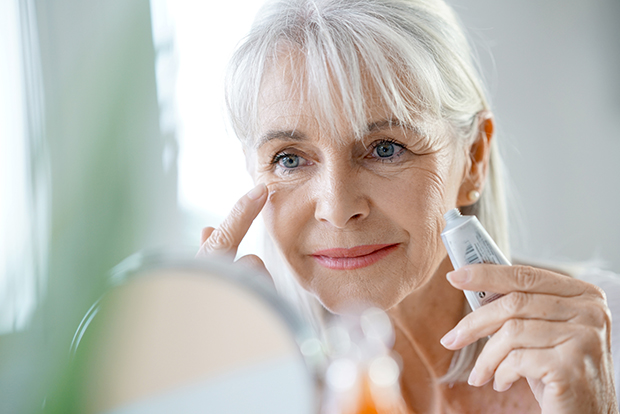
By Amy Kennard
Raise your hand if you’ve looked in the mirror and tugged a little at those creases around your mouth, frowned at those frown lines or widened those eyes to make the crows’ feet disappear.
Who can relate to feeling that flash of hot that makes you want to tear your clothes off? Are you constantly tired, yet can’t get a good night’s sleep to save your life?
Welcome to aging, Ladies. No doubt your ears perk up now when you hear those anti-aging commercials promising a more youthful appearance, relief of menopausal symptoms, weight loss, or a better sex life.
S. Jay Olshansky, Ph.D., a research associate at the Center on Aging at the University of Chicago, is about to rain on your parade. “Aging is a natural process, not a medical condition,” he says, “and there isn’t any therapy that can reverse or slow it down.”
The problem is, the anti-aging market is quite the money maker for those offering to let you drink from the fountain of youth, and some of the treatments they recommend can be harmful and downright deadly.
Anti-aging isn’t a specialty that’s recognized by the American Board of Medical Specialties, meaning doctors can’t officially be board-certified in it. Yet, it has its own professional society, the American Academy of Anti-Aging Medicine (A4M). Founded in 1992, A4M boasts some 24,000 members worldwide and offers a certificate in anti-aging medicine, available to any M.D.
Physicians of all specialties are getting in on this lucrative action with both physical and monetary consequences to their patients. The problem is, anti-aging doctors may be ill-trained to diagnose and treat what could be more serious underlying issues, and may even be harming their patients with trendy therapies.
A hormone headache
“The concept is that if you take a 60-year-old woman and duplicate the hormone environment from when she was 20, she’ll feel like she’s 20,” says Nanette Santoro, M.D., director of the Division of Reproductive Endocrinology & Infertility at the Albert Einstein College of Medicine.
Hormone therapy (HT), which encompasses estrogen as well as estrogen-progestin therapy, has been shown to effectively treat menopausal symptoms, but with an increase in the risk of uterine and breast cancer, heart disease, and stroke. A study in the 2010 Annals of Internal Medicine by the Women’s Health Initiative (WHI) confirmed that combination hormone therapy increased the risk of heart disease in healthy postmenopausal women. With so much controversy surrounding HT, it’s all that much more imperative that patients seek only the most qualified physicians when needing treatment.
Hormone injections such as HGH, which some physicians claim will reduce body fat, build muscle, improve sex drive, and increase energy, can predispose some people to heart disease, diabetes, and cancer. It’s actually illegal to distribute a product containing HGH for anti-aging purposes, since it’s only FDA-approved for a handful of conditions.
Bioidentical hormones use compounds found in plants, usually soybeans or yams. After the plant-based hormone is processed, its structure is said to be identical to the hormones your body produces — though this theory has not yet been proven. Though the ingredients may be FDA-regulated, many anti-aging physicians turn to compounding (mixing ingredients as outlined by a prescription at a compounding pharmacy) the hormones to tailor them to specific individuals. Because each prescription is custom-compounded for each individual patient, FDA approval and regulation is limited. In fact, according to the FDA, 43 percent of the compounded prescriptions didn’t contain what they were supposed to.
The skinny on supplements
Anti-aging supplements will not turn back the clock, plain and simple. However, certain supplements can help maintain your health as you age, such as fish oil for good heart health and vitamin D’s ability to help you absorb calcium. Combined with a healthy lifestyle, it could “appear” that you are in fact turning back the clock.
But, buyer beware. Most anti-aging supplements are a booming bonanza of bogusness, says Olshansky. In addition, anti-aging doctors price them for profit, and since they aren’t required to be FDA-approved, there’s no guarantee of their safety. That goes for skin creams as well as vitamins that promise to erase fine lines and prevent wrinkles. Most topical creams contain very low concentrations of antioxidants (known to prevent agents called free radicals from damaging the body’s cells) that aren’t well-absorbed by the skin or have very short-term effects. Some vitamins and creams can have negative side effects as well as interfere with other medications you may be taking.
So how do we fight aging?
Winifred K. Rossi is the deputy director of the Division of Geriatrics and Gerontology at the National Institute on Aging. “The best advice is not very different from what our mothers told us: maintain a healthy weight, be active, eat nutritious food, and don’t smoke,” she says. Physicians advise 1,200 milligrams per day of calcium, preferably from food, and 2,000 IU daily of vitamin D in a supplement.
This back-to-basics approach may not sound as cutting-edge as special injections or souped-up supplements, but it’s time-tested and a lot less costly — for your wallet and your health. “Many of the benefits that are associated with HGH — you can get those with exercise, for free,” says Olshansky.
The best advice? See your OB/GYN as recommended, and once you reach your 40s, add in a family practice doctor or internist, too, since they are qualified to handle routine issues that come with middle age. But, as far as any “serious” issues? Leave that to the experts to ensure that you are being cared for smartly and safely.

